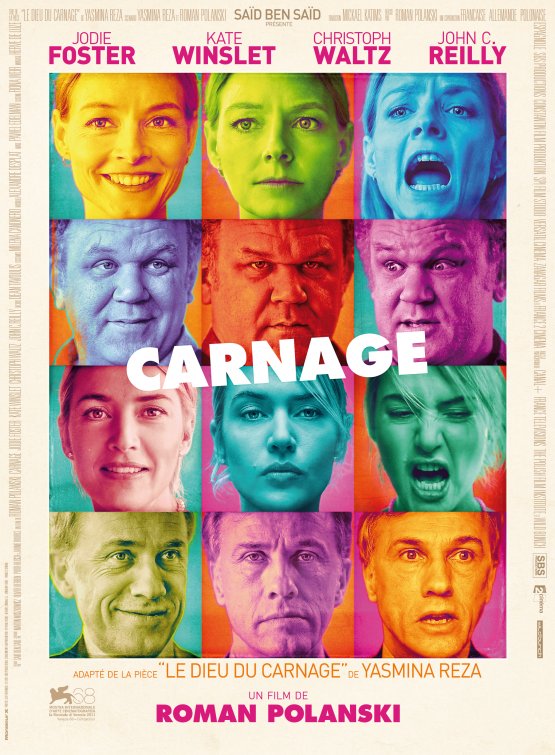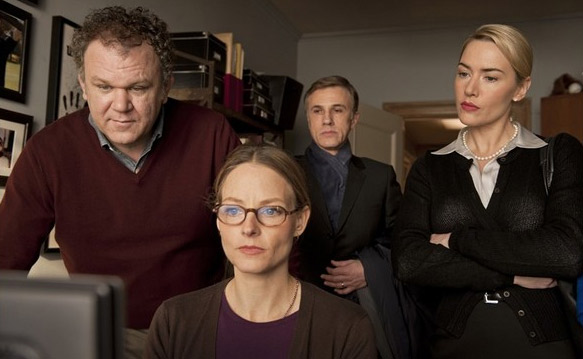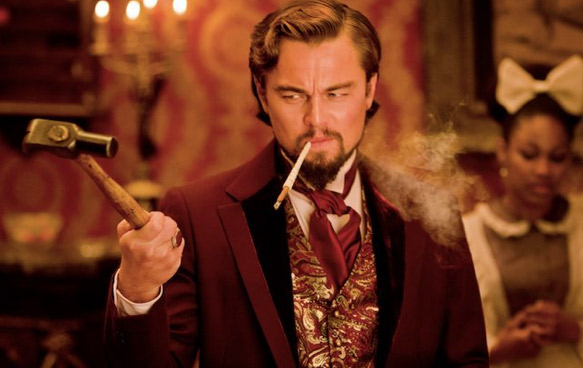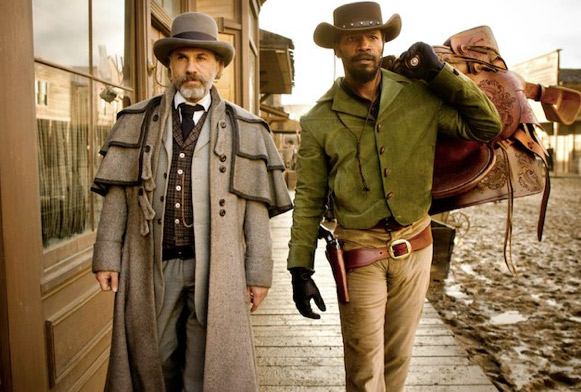 Though critics screenings have been well under way for some time, tonight is the official opening night of the New York Film Festival. The kick off film is Roman Polanski's Carnage, about which we should undoubtedly say a few words. And then scream them, as we lose our composure.
Though critics screenings have been well under way for some time, tonight is the official opening night of the New York Film Festival. The kick off film is Roman Polanski's Carnage, about which we should undoubtedly say a few words. And then scream them, as we lose our composure.
Moviegoers who have seen Yasmina Reza's hit play "God of Carnage" in any of its many stage productions, had just cause to fear a film version; it's very much a work of the stage. What if they cast the two young boys whose stick-wielding playground tussle prompts all the (psychological) carnage between their parents, who meet to discuss the fight? What if the movie leaves the apartment where the entire play takes place? What if the actors can't handle the tricky satirical tone that has to be rooted in internal drama but stylized enough to extract external laughs?
The first two fears involve the dread "open it up" problem that hover like dark storm clouds over so many stage-to-screen adaptations. If you don't "open it up" you run the risk of your movie feeling weirdly hemmed in and even cheap. If you do "open it up" you run the risk of arbitrary and awkward resizing that feels more like nervous approval-seeking then an attempt to serve the material. With Roman Polanski, an expert at claustrophic storytelling, guiding the tight-quarters squabbling perhaps we shouldn't have worried.
The trouble-making sons of Penelope and Michael Longstreet (Jodie Foster and John C Reilly) and Nancy and Allen Cowan (Kate Winslet and Christoph Waltz) do appear in the film but in a wonderfully smart and ambiguously played framing device. This change from the play stays magically true to the spirit of the source material but is also entirely new and right for the change in medium (which is EXACTLY what adaptations should strive for). So the first thing Roman Polanski does right is that even though we do technically leave the confines of a realistically sized New York apartment (i.e. small) both visually and physically (the apartment building's hallway), we never once feel as though we've escaped the crowded private hell of two married couples. For a smartly succinct 80 minutes (it happens in real time) you are trapped with the parental quartet and their justifiable concern: what to do about a violent encounter between their children. The comedy and drama of the play-turned-movie are the ways in which said real and justifiable but basic-sized problem morphs, twists, pivots, wiggles, shrinks and expands -- it just can't hold its shape -- until it's a series of problems both microcosmically petty (home cooking, name calling, cel phones) and gargantuan unsolvable (Genocide! Corporate Greed! Marriage!).

For the most part the actors all do solid work. Christoph Waltz, in the film's best and most nimble performance, ably suggests that Alan is a bit of a sadist and the only one who is actually enjoying all the squabbling and suffering (until he isn't). John C Reilly has the biggest about face, appearing to be the most accomodating character (and the dullest actor) until alcohol and aggravating phone calls from his mother loosen him up. Kate Winslet and Jodie Foster, two of the screen's most formidable actresses are both good. Kate is best with Nancy's comedic outbursts (her weak stomach and quick inebriation, just as in the play, provides some of the most memorable moments) but one wishes for more character detail in the inbetween when she isn't the focus of the scene. Foster has the most difficult role. Penelope is an extremely uptight and self-righteous Africa-obsessed mother and she's the one character that's simultaneously the worst at keeping it together and the one most concerned with keeping it together. Though Foster has fine moments her comedy is the wobbliest; one ends up pitying Penelope more than laughing with or at her which is a strange place to end up inside of a viciously dark comedy. Still, there's a certain go-for-broke original bravura in Foster's vein-popping despair (hers is the performance least like the original play's), that one has to admire it even while one mentally recasts.
As Carnage winds down... Stop. Winds down? Yes, though Polanski often comes up with clever angles by which to watch the four characters interact, the film does run into some trouble with momentum which the play didn't have. The hallway scenes offer new and funny ways of thinking about the fact that the couples can't seem to end their evening even while their hatred for each other grows, but they strain credulity as well. If you're that close to leaving... There are strange lulls just as things are reaching fever pitch, and the ending itself is one of those and weirdly sedate.
 Despite Polanski's very smart and controlled approach to the material, one almost wishes he'd taken a page from Jodie's book and just gone jugular. He employs so many different techniques to keep you visually stimulated: depth of focus, variety of shot lengths, staging, camera stability (things get a bit shakier in time with the copious alcohol) that one almost wants to scream at him to commit to one of them, embrace it feverishly and "DO IT UP REAL BIG LIKE!!!" Take your cues from Winslet's ugly vomiting, Foster's whiny-screaming or Christoph Waltz's man-pouting and let your hair down a little. Lose your composure. Risk bloodying yourself up but good.
Despite Polanski's very smart and controlled approach to the material, one almost wishes he'd taken a page from Jodie's book and just gone jugular. He employs so many different techniques to keep you visually stimulated: depth of focus, variety of shot lengths, staging, camera stability (things get a bit shakier in time with the copious alcohol) that one almost wants to scream at him to commit to one of them, embrace it feverishly and "DO IT UP REAL BIG LIKE!!!" Take your cues from Winslet's ugly vomiting, Foster's whiny-screaming or Christoph Waltz's man-pouting and let your hair down a little. Lose your composure. Risk bloodying yourself up but good.
Carnage (2011) is maybe the best film version one could hope for given the absolute stageyness of the source material but it's good enough that it leaves you wanting one that you didn't dare hope for. B/B-*
Previously on NYFF
Miss Bala wins the "must-see crown" from judge Michael.
Tahrir drops Michael right down in the titular Square.
A Dangerous Method excites Kurt... not in that way, perv!
The Loneliest Planet brushes against Nathaniel's skin.
Melancholia shows Michael the end of von Trier's world.
* Carnage is unique enough that the grade probably doesn't suggest how "see worthy!" it actually is. It's also the kind of property one might conceivably feel differently about on a second pass. For those of you wondering Carnage's best bet Oscar-wise is an Adapted Screenplay nomination. Since no consensus seems to have formed about "best in show" acting traction will be hard to come by for a shared movie.
 Friday, April 27, 2012 at 7:17PM
Friday, April 27, 2012 at 7:17PM 













